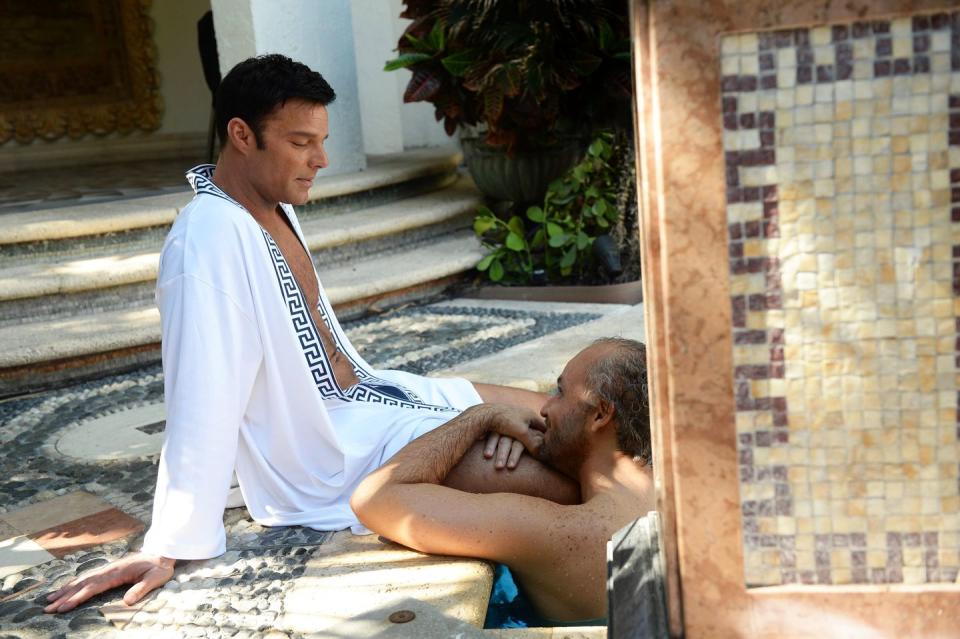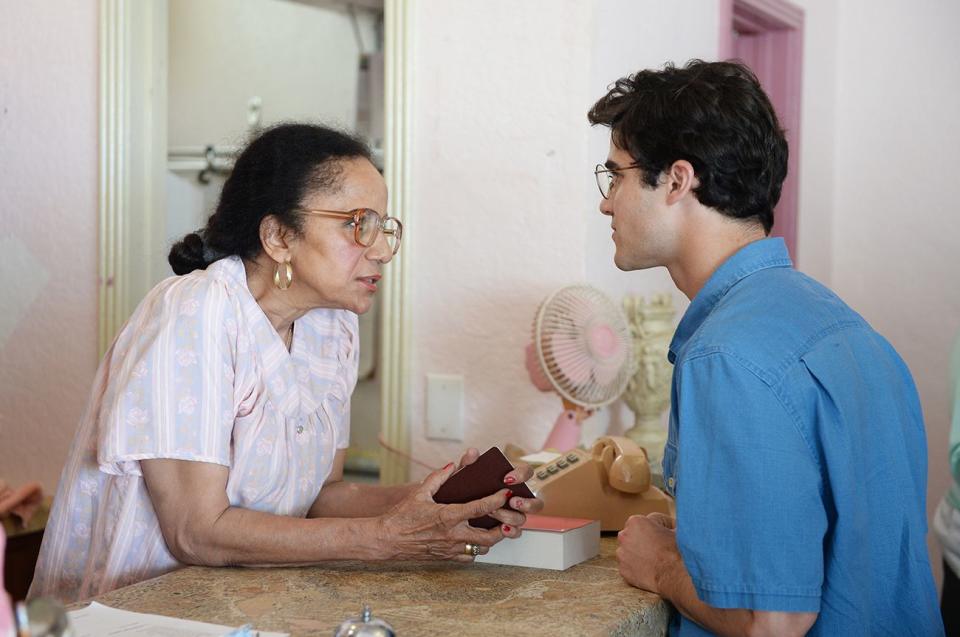'The Assassination of Gianni Versace' Addresses Versace's HIV Status

There are a lot of deliberate ambiguities woven into the storyline of The Assassination of Gianni Versace: American Crime Story, most of them related to Andrew Cunanan and the smooth, effortless lies he tells about himself. As I noted last week, it's often unclear whether what we're seeing is a) what actually happened in reality, b) what actually happened in the show's fictionalized version of reality, or c) Cunanan's self-aggrandizing, unreliable version of events. But the season's second episode opens with a discussion of what has become the most controversial fact vs. fiction element of the show: Versace's HIV status.
The Versace family has released a pair of statements denouncing the show as "“sad and reprehensible" and specifically taken issue with its depiction of a "medical condition." In the source material for the series—the book Vulgar Favors, by Vanity Fair journalist Maureen Orth—it is reported that Versace was HIV positive at the time of his death, which the Versace family has always denied.
With that context established, let's get into five talking points from tonight's episode 'Manhunt.' Plus, keep track of this season of American Crime Story with this timeline of Andrew Cunanan's murder spree.
1) According to the series, Versace had already come close to death—and miraculously cheated it—shortly before he was murdered.
"After everything he survived... to be killed like this?" Donatella says, quietly heartbroken, after we've seen flashbacks to Versace seeking treatment at a hospital, hiding behind sunglasses until a nurse reassures him, "there are no journalists here." Though the terms HIV and AIDS are never used, the implication is clear: Versace has a condition which requires a cocktail of drugs, and he is determined to keep it secret at all costs. He's become too sick to work, or even walk at a normal pace, and confesses to Antonio that he's becoming bitter as a result.
2) The story of Andrew Cunanan's rampage is being told in reverse.
This won't remain strictly the case throughout the series, but last week depicted Cunanan killing Versace, and this week takes us back roughly two months to the day he first arrived in Miami to stalk Versace. At this point, Cunanan had already killed four people, landed a spot on the FBI's Most Wanted list, and stole the red pickup truck he's driving from his fourth victim, William Reese. On the subject of which... let's talk about that singing scene.

Cunanan is utterly elated in the wake of all this bloodshed, and Darren Criss's pure manic energy throughout this episode is breathtaking. As he cheerfully drives through South Carolina towards Florida, he turns on the car radio and flips right past a station that mentions his name as a suspect in the murder of Lee Miglin. He lands, instead, on a station playing Laura Branigan’s "Gloria," a peppy disco fave whose lyrics are actually deeply disturbing if you listen closely:
Are the voices in your head calling, Gloria?
Gloria, don’t you think you’re fallin’?
If everybody wants you, why isn’t anybody callin’?
Can't imagine why Cunanan would sing along to this with such gusto!
3) Versace's illness brings out long-buried tensions between Donatella and Antonio.
In the aftermath of Versace's death last week, it was clear that these two do not see eye to eye. This week—between Versace's illness and the company's struggle to stay relevant in a changing fashion landscape—exacerbates their differences. Antonio claims Donatella has never been supportive of his relationship with Gianni, despite how long they've been together, while Donatella clearly feels that Antonio has never been a real partner to her brother. "You've given him nothing," she spits—not stability, not respect, not children—and though she doesn't say this explicitly, it's clear she blames Antonio for Versace's inferred illness, in light of their proclivity for three-ways. I wish I were more engaged by Versace's relationship with Antonio, but their scenes together feel strangely lifeless to me, and I think it's because Ricky Martin is miscast in this role.

4) "We were friends. That was real, right?” “When someone asks you if we were friends, you’ll say no.”
It almost seemed like Cunanan might have made a friend in Ronnie, the wiry Miami Beach local played by New Girl's Max Greenfield—if Cunanan were capable of feeling anything for anyone, which is highly debatable at this point in the story. The above dialogue exchange is heartbreaking because Ronnie is so vulnerable, but it's actually one of Cunanan's few honest moments: he knows, at this point, that he's living on borrowed time and is going to be caught, and that Ronnie will eventually deny knowing him for his own good.
But that's not the only moment where Cunanan is unexpectedly honest with Ronnie. Maybe he doesn't consider Ronnie to be important or influential, so the stakes are low. When Cunanan's just come back from an outing—which involved seducing, terrorizing and nearly suffocating an elderly man with masking tape—a justifiably nervous Ronnie asks a wide-eyed, jittery Cunanan "What did you do?" Cunanan's reply: “Nothing. I did nothing. I’ve done nothing my whole life. That’s the truth.” That is the truth, and it might be the last time we hear it from Cunanan.
5) Watching Cunanan slip from one false identity to the next—sometimes within a single sentence—is dazzling.
I cannot say enough about the sharp, scary writing for Cunanan, nor about Criss's flat-out terrifying performance. This is someone who practices in the mirror for everyday conversations and creates entire personas on the spot; when he checks into the beachside motel in Miami, he's Kurt! He's from Nice! He's a fashion student who traveled all this way just for a few words with Versace! To Ronnie, Cunanan effortlessly describes his close personal friendship with Versace; to the elderly man he seduces, he waxes poetic about the lobster and cracked black pepper his mother used to bring to him for school lunches. Is any of this true? Who knows? It's not even entirely clear that Cunanan knows, or that he cares.

This is all embodied so beautifully in a dizzying final nightclub scene where Cunanan, still high on the thrill of his crimes, is approached by a young man who asks what he does. "I'm a serial killer!" he says gleefully, the club music loud enough to drown out his confession, and then launches into a cheerful verbal breakdown, listing one fake profession after another: he's a banker! He's a writer! He imports pineapples from the Philippines—a reference to the story he told Versace last week about his father's pineapple plantations. But most importantly? "I'm the person least likely to be forgotten."
You Might Also Like